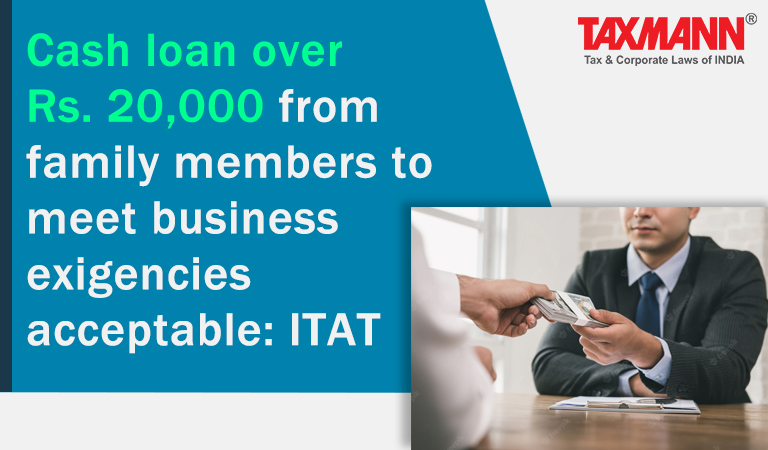Cash loan over Rs. 20,000 from family members to meet business exigencies acceptable: ITAT
- Blog|News|Income Tax|
- 2 Min Read
- By Taxmann
- |
- Last Updated on 28 April, 2022

Case Details: Balwan Singh v. ACIT - [2022] 137 taxmann.com 395 (Delhi - Trib.)
Judiciary and Counsel Details
-
- Saktijit Dey, Judicial Member and Pradip Kumar Kedia, Accountant Member
- Mohit Bansal, CA for the Appellant.
- Mrs. Suman Malik, Sr. D.R. for the Respondent.
Facts of the Case
Assessee-transporter was engaged in the business of plying the truck and filed return based on estimations with reference to gross receipts derived. During a survey, Certain documents and registers were impounded from the business premises towards lorry receipts, expenses, and other entries.
During the assessment, the assessee could not produce any books of accounts and claimed that he does not maintain any regular books of account. The assessment was completed based on registers impounded.
These registers allegedly contained entities of cash receipts and cash payments exceeding Rs. 20,000/- from various persons which are admitted as cash loan deposit receipts and cash loan deposit repayments. The Assessing Officer (AO) invoked the provisions of sections 271D and 271E for alleged infringement of sections 269SS and 269T and imposed penalties.
The assessee challenged the imposition of the penalty before the CIT(A). However, the CIT(A) dismissed the appeal of the assessee. Aggrieved-assessee filed the instant appeal before the Tribunal.
ITAT Held
The Delhi Tribunal held that as per the statement recorded under Section 133A, the assessee took a temporary cash loan from family members to meet the business exigency having regard to the nature of the business he was involved in. The fact of business exigency had not been denied by AO.
Repayments of such loans were made in a few days against the receipt from transportation and the amount involved is very small. No inquiry had been made with the corresponding family members for granting such hand loans.
Assessee being uneducated does not understand such laws and thus no books of accounts were maintained. The impromptu response of the purportedly uneducated assessee at the time of the survey requires to be seen in its natural perspective and requires to be given credence. It is practically unfeasible for an uneducated or undereducated assessee or its drivers and staff to make effective use of any banking channel.
When the assessee had declared that the money was received from family members to meet the business exigencies. Having regard to the nature of business of the assessee and ground realities, such an explanation appears plausible. Thus, the order of the CIT(A) was to be set aside the order of the CIT(A), and the penalty imposed under sections 271D and 271E was to be canceled.
List of Cases Referred to
-
- Dy. CIT v. Rupen Dass [2011] 16 taxmann.com 35 (Kol.) (para 6)
- CIT v. Balaji Traders [2008] 167 Taxman 27/303 ITR 312 (Mad.) (para 6)
- CIT v. Lakshmi Trust Co. [2008] 303 ITR 99 (Mad.) (para 6)
- Dy. CIT v. Vignesh Flat Housing Promoters [2007] 105 ITD 359 (Chennai) (para 6)
- Dillu Cine Enterprises (P.) Ltd. v. Addl. CIT [2002] 80 ITD 484 (Hyd.) (para 6)
- Hindustan Steel Ltd. v. State of Orissa [1972] 83 ITR 26 (SC) (para 6).
Disclaimer: The content/information published on the website is only for general information of the user and shall not be construed as legal advice. While the Taxmann has exercised reasonable efforts to ensure the veracity of information/content published, Taxmann shall be under no liability in any manner whatsoever for incorrect information, if any.

Taxmann Publications has a dedicated in-house Research & Editorial Team. This team consists of a team of Chartered Accountants, Company Secretaries, and Lawyers. This team works under the guidance and supervision of editor-in-chief Mr Rakesh Bhargava.
The Research and Editorial Team is responsible for developing reliable and accurate content for the readers. The team follows the six-sigma approach to achieve the benchmark of zero error in its publications and research platforms. The team ensures that the following publication guidelines are thoroughly followed while developing the content:
- The statutory material is obtained only from the authorized and reliable sources
- All the latest developments in the judicial and legislative fields are covered
- Prepare the analytical write-ups on current, controversial, and important issues to help the readers to understand the concept and its implications
- Every content published by Taxmann is complete, accurate and lucid
- All evidence-based statements are supported with proper reference to Section, Circular No., Notification No. or citations
- The golden rules of grammar, style and consistency are thoroughly followed
- Font and size that’s easy to read and remain consistent across all imprint and digital publications are applied



 CA | CS | CMA
CA | CS | CMA
